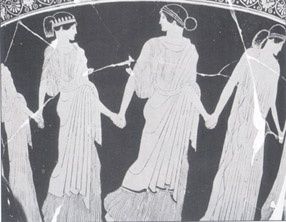I’ve read Dimitris M Papadakis’ response, and I’m quite happy to vehemently disagree with him. And of course…
Many modern Greek citizens may, of course claim otherwise, but there ought to be a distinction between those who happen to be Greek citizens and those who have a Greek mind and adhere to a Greek, that is genuinely “hellenic”, worldview.
… the disagreement is all about whether Modern Greek identity can admit any “oriental” element at all, or whether all Greek popular culture should have impeccably classical credentials.

Not a Tsifteteli

Possibly a bit closer to a Tsifteteli
The dance is certainly an innovation in Greece, and appears to have been come about with rebetiko music. While there are some elements to rebetiko that were indigenous to Greece, the major impetus for it came with refugees from Asia Minor, and tsifteteli similarly reflects Asia Minor popular culture. The claims of Byzantine or Ancient Greek antecedents are pretty blatant stretching.
It’s fair to say that the tsifteteli is low culture; word association with tsifteteli will bring up skyladiko “dog pound”, the low rent brash bouzouki joints out of town.
In my book, that’s just fine. There’s a prudishness in Greek folk culture (folk song outside of Cyprus does not acknowledge women have bodies—except for during carnival, when they only acknowledge they have bodies). The self-consciously sensuous dancing of the tsifteteli is something I find a welcome antidote to it.
Yes, it’s a dance starlets use to show off:


But notice, the cool young male thing to the left is having just as good a time of it.
One of the oddities of tsifteteli is that, quite often, it’s women that end up dancing it with each other. Not necessarily because they’re flirting with each other; more like, there isn’t enough critical mass of men feeling unselfconscious enough to join them. Which in any case means there’s a little more going on than:
None whatsoever beyond entertainment and flirting or lusting over the female body in front of you.
… and, really, they said the same about waltzes.



